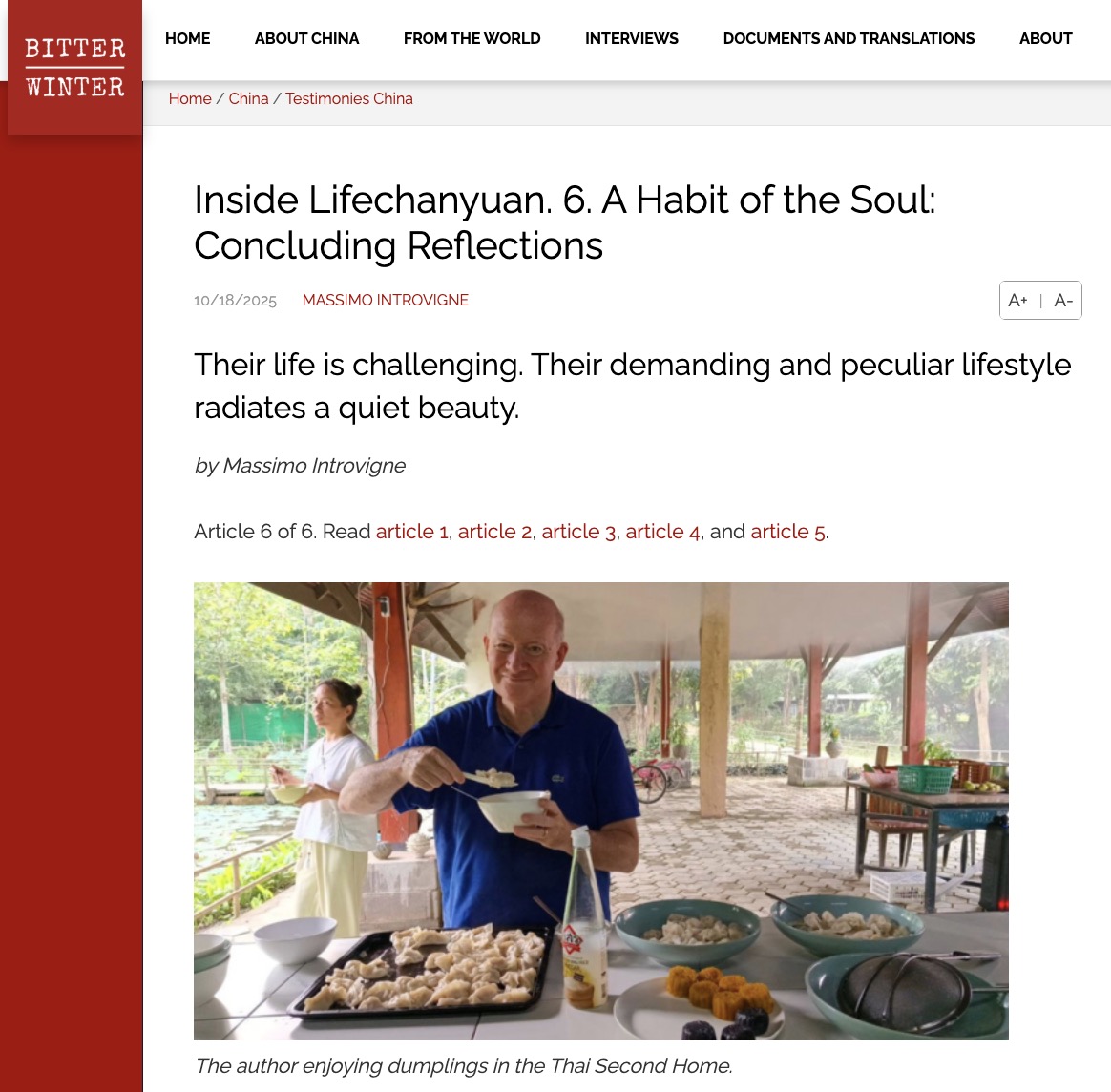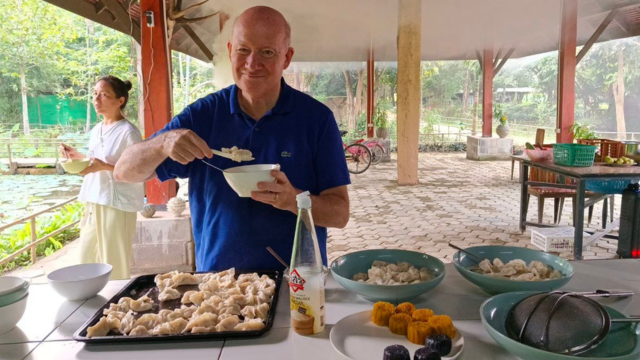|
Massimo Introvigne, Editor of Bitter Winter, Published the Sixth Article about Lifechanyuan and the Second Home
Jiejing Celestial
November 13, 2025
We are pleased to share the sixth and concluding article in the series: “Inside Lifechanyuan: A Habit of the Soul — Concluding Reflections”, published on October 18, 2025.
This final chapter gathers the editor’s own reflections and insights, while also recording the experiences and inner journeys of several members of Lifechanyuan. It is both a personal meditation and a collective testimony, weaving together voices that reveal the depth of spiritual practice and the resonance of communal life.
Inside Lifechanyuan. 6. A Habit of the Soul: Concluding Reflections
10/18/2025 Massimo Introvigne
Their life is challenging. Their demanding and peculiar lifestyle radiates a quiet beauty.
by Massimo Introvigne
Article 6 of 6. Read article 1, article 2, article 3, article 4, and article 5.
The author enjoying dumplings in the Thai Second Home.
My interest in Lifechanyuan began not with theology or utopia but with persecution. Reports of heavy-handed raids in China—detentions, forced “deprogramming,” and surveillance—led me to investigate. During my stay at the Thai Second Home, I listened to personal accounts from four Celestials who had lived through the 2021 crackdown: three from Tongzi and one from Anlong.
They described being bound with ropes, loaded at gunpoint onto buses, and taken to hotels or police stations where they were watched around the clock. The police already knew who they were. At the stations, they were met by officers from their hometowns, who escorted them back and placed them under local surveillance. They were forbidden to leave their towns and threatened with incarceration if they maintained contact with Lifechanyuan.
Their escape stories were as harrowing as they were resourceful. One woman obtained a new passport in a city far from her own. Another was stopped at Shanghai Airport—where controls are notoriously strict—but rerouted through Macau, where she slipped through and flew to Thailand. These accounts confirm what I have heard from refugees of other banned religious groups: the objection by immigration authorities in democratic countries that banned believers can never obtain passports or cross borders in China is simply incorrect.
One Celestial, raised as a Hui Muslim, shared a particularly poignant journey. She had joined Falun Gong in hopes of healing chronic health issues—and found relief. Between 1999, when China cracked down on Falun Gong, and 2017, she was repeatedly detained and beaten. In 2017, she was sentenced to two years in jail, where she was mocked and beaten by guards who sneered sarcastically, “Look, here comes the Buddha.” After her release in 2019, she faced discrimination as an ex-convict. Cameras were installed in her home, and uniformed and plainclothes police were stationed outside her house.
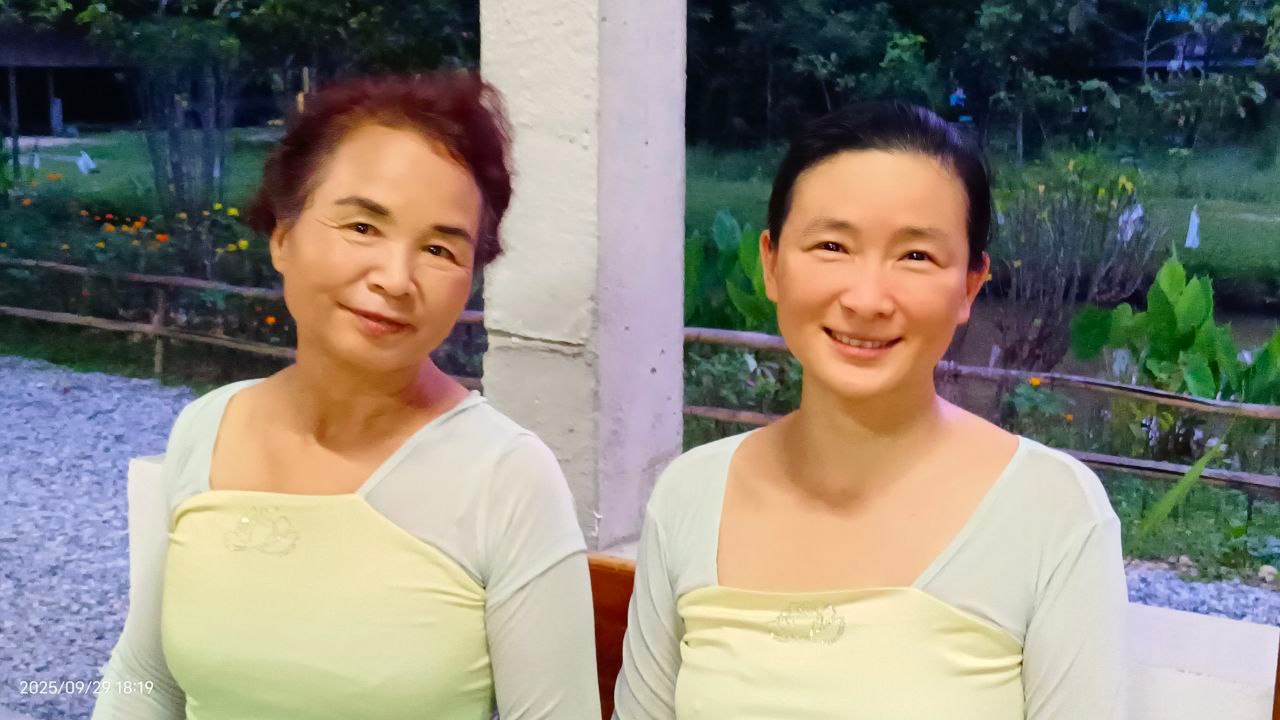
The Celestial who is a former Falun Gong practitioner (on the left), with a fellow Celestial in Thailand.
A friend gave her the “800 Values” book of Lifechanyuan. She had long been puzzled by the question of why the Chinese are called the “descendants of the dragon” and never found an answer, until she found the writings of Guide Xuefeng (see article 3 in this series). She believed. She told the authorities she had left Falun Gong—which was true—but concealed her new affiliation. That was enough to secure a passport and reach Thailand. Even there, she received calls from the Chinese police. She reiterated her departure from Falun Gong, then deleted her old phone numbers.
She also discussed overcoming her religious taboo against pork. In Falun Gong, she continued to abstain. In Lifechanyuan, she viewed dietary restrictions as “religious programs” to be transcended. The community does not eat wild animals and avoids killing when possible. It is taught by Guide Xuefeng that “when an animal is being killed, its indignation and resentment will cause it to release a toxin in its meat. We will absorb the toxin when we eat the meat.” It considers refraining from eating meat as a form of compassion. However, necessity sometimes requires otherwise. “Whether one eats meat or not depends on the actual situation.”
When police threatened to confiscate their chickens in China, they killed them. They also have pigs slaughtered for meat—but not without ceremony and precautions to reduce their suffering. Members speak and “chant scriptures” to the animals, thanking them and suggesting their sacrifice may help their reincarnation into human form. “Pigs usually scream like hell,” one Celestial told me, “but ours go peacefully. It is as if they understand.”
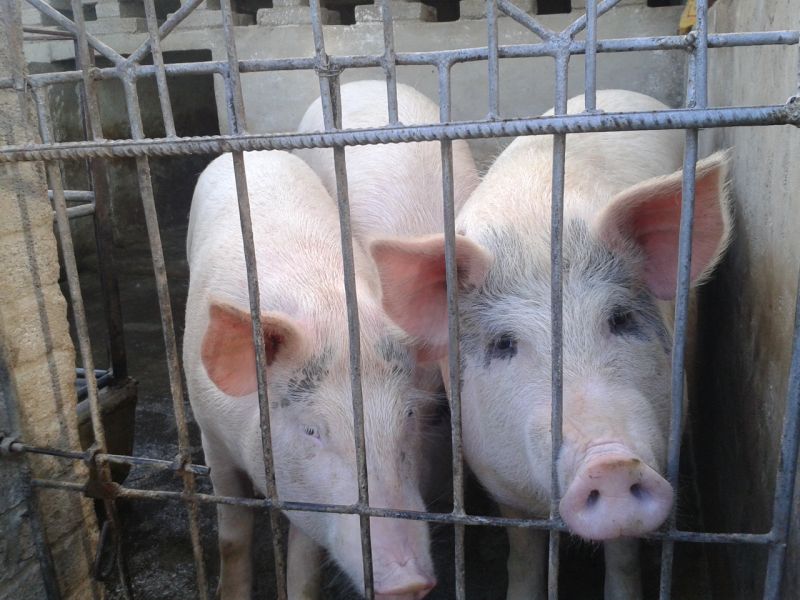
Pigs kept by Lifechanyuan in the Yinyi Ecovillage.
The Celestials I met came from diverse backgrounds. All but one were from China; one had recently arrived from Malaysia. Some learned about Lifechanyuan through friends, but most found it online—even after the raids. The website is banned in China, but many access it via VPN. To join, one needs to study the “800 Values,” contact Guide Xuefeng, be approved, and receive a new name. Former members may have a second chance to join. A Celestial living in Thailand left the movement, tried marriage (which she described as “absolutely miserable”), reapplied, received a second Celestial name, and joined the Thai Second Home.
They have hosted around one hundred visitors, mostly New Agers. Many appreciate the community, but few express interest in joining. Contacts are maintained through the Internet and international networks of voluntary communities. A German anthropologist who visited them in China introduced them to the Italian community of Damanhur. They saw similarities—though Damanhur allows temporary marriages, renewable by mutual consent, while Lifechanyuan’s rejection of marriage and even stable one-on-one relationships is more radical.
Lifechanyuan resists labels. It does not call itself a religion, a movement, or an organization. It is, in their words, an “international family.” One Celestial offered a more poetic definition of a spiritual habitat or sanctuary: “a habit of the soul.”
They revere their teacher, Guide Xuefeng, as a unique individual. He is not worshipped. He is a messenger of the Creator God. Members believe he was announced by Boriska Kripiyanovich, a Russian boy born in 1996 who claimed to be from Mars and prophesied the arrival of a great teacher. Boriska became a New Age sensation before mysteriously disappearing (he would be 29 today, and speculations on his fate abound on the web). Guide Xuefeng claims to be the teacher Boriska foretold.
Still, the focus is not on Xuefeng. As his designated successor in Thailand told me, “Ideally, we all should connect directly with the Greatest Creator. But most people need guides. The master teaches you during the journey—but when you arrive at the destination, you are the master.”
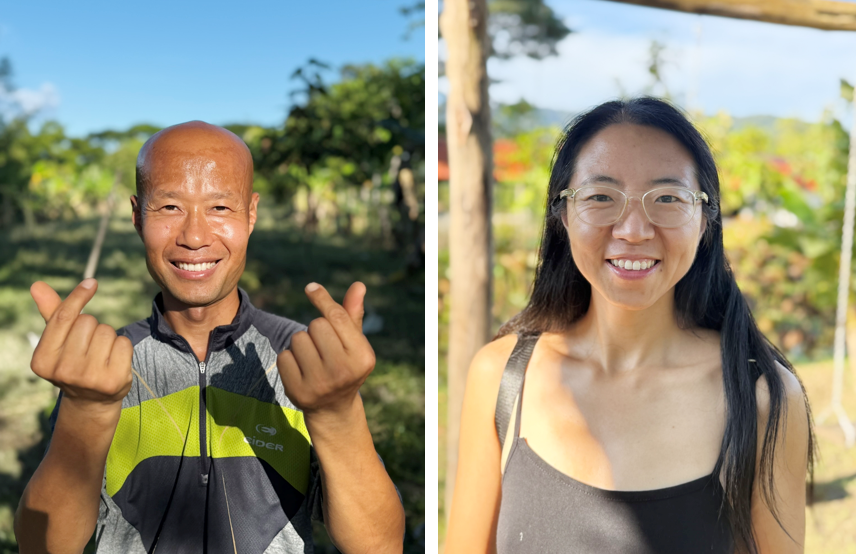
Two Celestials from the Thai Second Home.
In my view, Lifechanyuan is as much an anarchist experiment as a communist utopia—though they do not refer to the anarchists of old. The “800 Values” invite followers to emulate “Jesus Christ, Buddha Sakyamuni, Lao Tzu, and Mother Teresa.” Some Christians have called them “Satanists,” misunderstanding their gnostic interpretation of Satan’s role. Chinese authorities see them as subversive, as they do not align with Xi Jinping’s slogans and claim their spiritual communism is superior to the CCP’s materialist version. Even their Canadian bank has become suspicious and tried to cancel their account.
Yet, they are a peaceful community. Their lifestyle is not for everyone. The Celestials told me how challenging it is, especially in the early months. The difficulty is not physical—though working the fields in a remote corner of Thailand is no small feat—the real challenge is emotional and relational: learning to merge with the group, overcoming natural antipathies, loving everyone, and practicing physical intimacy without attachment.
They love children, but only one in the Thai Second Home was born before his parents joined. The precarious legal status of the community in Thailand has discouraged childbearing, though it remains a personal choice.
Some of their struggles stem from Chinese persecution, while others are common to intentional communities around the world. I have a different perspective on religion, society, and family. But it is not the scholar’s job to judge—only to observe and understand.
And I did understand. In my days among the Celestials, I saw a demanding, peculiar lifestyle that radiates a quiet beauty. They live with purpose. They smile with conviction. Their happiness is infectious.
My journey to study this unique community continues.
Link: https://bitterwinter.org/inside- ... luding-reflections/
|
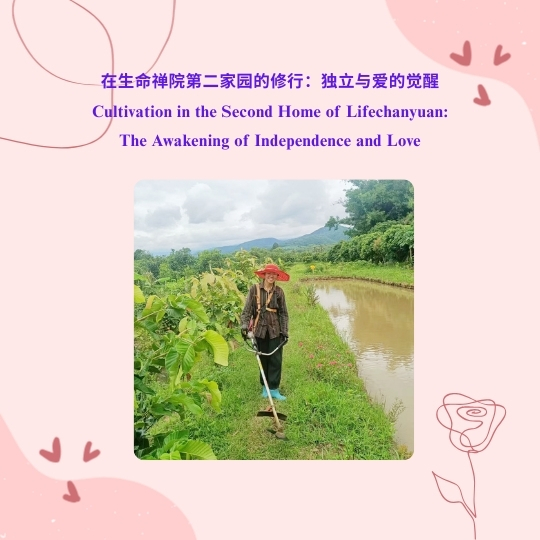 Cultivation in the Second Home of Lifechanyuan: The Awakening of Independence an
Cultivation in the Second Home of Lifechanyuan: The Awakening of Independence an
 Six Reports on Lifechanyuan and the Second Home by Massimo Introvigne, Editor of
Six Reports on Lifechanyuan and the Second Home by Massimo Introvigne, Editor of
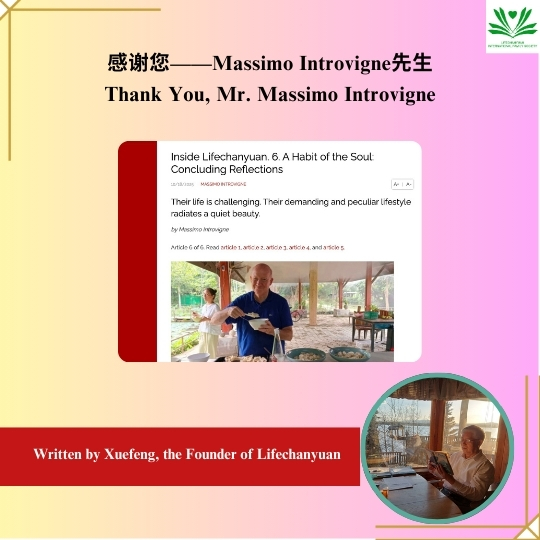 Thank You, Mr. Massimo Introvigne
Xuefeng
October 14, 2025
Dear Mr. Massimo In
Thank You, Mr. Massimo Introvigne
Xuefeng
October 14, 2025
Dear Mr. Massimo In
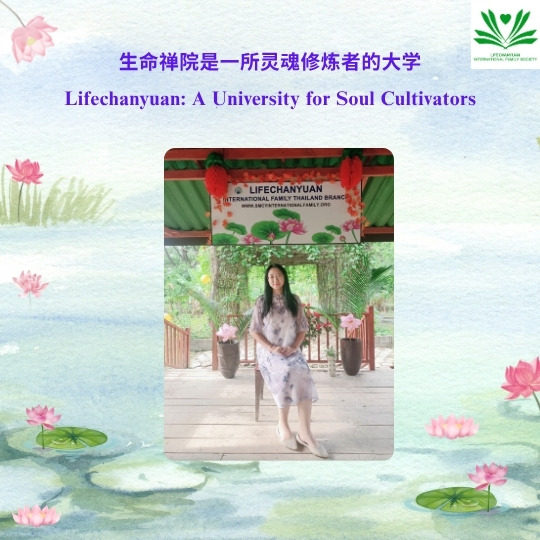 Lifechanyuan: A University for Soul Cultivators
Written by Jiejing Celestial|N
Lifechanyuan: A University for Soul Cultivators
Written by Jiejing Celestial|N
 Massimo Introvigne, Editor of Bitter Winter, Published the Sixth Article about L
Massimo Introvigne, Editor of Bitter Winter, Published the Sixth Article about L
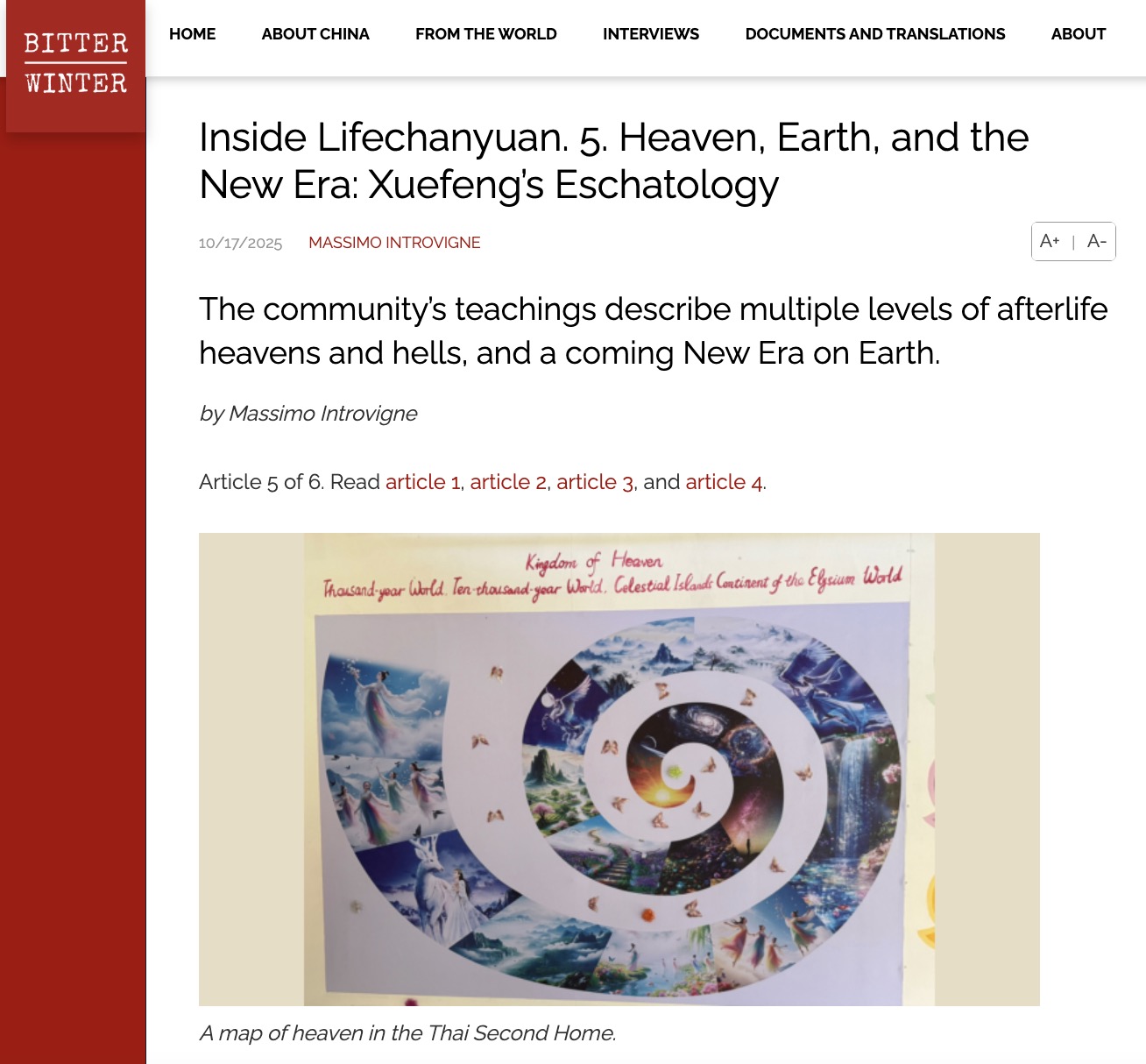 Massimo Introvigne, Editor of Bitter Winter, Published the Fifth Article about L
Massimo Introvigne, Editor of Bitter Winter, Published the Fifth Article about L


 Post time 2025-11-13 17:37:12
Post time 2025-11-13 17:37:12



